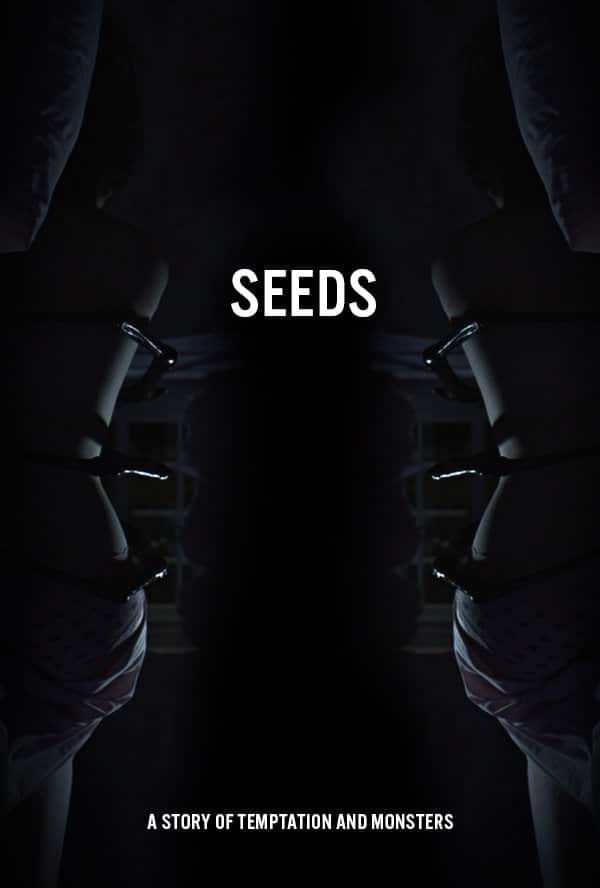
Placing monsters on screen – as in your vampires, or your aliens, or so on – has its own share of challenges, but at core, there’s a fairly obvious requirement to, well, get the monsters on screen. When you are aiming to represent monstrous behaviour or thoughts, however, this can be rather more tricky, even whilst allowing a great deal of scope for how this is done. This brings us to Seeds (2018), a thoughtful, very sombre examination of a damaged man, as he comes to terms with the path he has lately taken. It’s not a particularly easy watch, though this has to rank as one of the film’s key strengths.
An idyllic family beach scene opens the film, though cedes very rapidly into something altogether darker – our key character Marcus (Trevor Long) is taking part in a sexual game which goes badly wrong, requiring the intervention of a friendly fixer-upper to take care of the aftermath. Marcus then leaves the scene, heading away to the old family home on the coast of New England, presumably to recuperate and to gather his thoughts. This should be the ideal place. His brother and family live nearby, and the house itself is rather grand and comfortable – the perfect place to recover from whatever sequence of unfortunate events recently befell him. However, a few neat visual clues soon show us that all is not as it seems here. Yes, the idyllic beach of the opening reels is this beach, and the little girl running back to the house with a hermit crab to show to her family is all grown up now – this being Marcus’s niece Lily (Andrea Chen). But this is no simple family reunion; his brother Michael and wife Grace are having a tough time, the isolation of the small close-knot community is taking its toll, and as if this wasn’t enough, there’s something as-yet unspoken going on between Marcus and his long-time-no-see niece. When Lily and her younger sibling have to come and stay with Marcus unexpectedly, this source of anxiety begins to shift and develop. Marcus’s already rather slippery grasp on right and wrong is about to let loose altogether, and from here on in, Seeds becomes more and more of a horror story – even if continually very subtle and ambiguous.

This is a film which layers discomfort on top of discomfort, and as it tackles the spectre of incestuous feelings, it certainly isn’t subject matter to relish – by no means will this be for everybody. But, thankfully, Seeds is far more than just a version of Lolita set elsewhere and in a different time, and it does a range of interesting things with its themes, contemplating what these contested emotions could do to a person. In effect, if a person acknowledges something monstrous is in them, how can this be shown to an audience? Seeds opts to be very dialogue-lite, with a very deliberate pace and atmosphere which is occasionally disrupted by a sudden, shocking sequence; this tactic helps to underline key developments along the way. Visual representations of trauma are, largely speaking, very subtle, threading together elements from the past and elements we recognise from the present moment. All of this is very beautifully packaged, shot on film (which looks great) with an artistic eye and a wide range of shots, from macros to landscapes, and some great soundscapes. These all showcase high levels of skill, and overall this care and attention helps the film to deliver.
Perhaps my main criticism would be with regards the quandary faced by filmmakers when dealing with the concept of exploring an underage relationship. On one hand, they can’t throw in a genuinely underage actor to subject matter of this kind in this day and age, and nor should they – that would be all kinds of unpalatable to modern audiences. However, to get the audience to believe in the relationship aspect, the actor still needs to…look younger. It’s a sizeable divide, with no real easy way around. So, whilst Andrea Chen does a good job with her role as Lily, it is still somewhat difficult to see her as a vulnerable teen, as she must surely be intended to be, being as she’s in fact around thirty at the time of filming. By no means is this an issue unique to Seeds. But it is something of an issue in the suspension of disbelief, at least part of the way.
So, this issue notwithstanding, and also accepting that Seeds is not a film which will be to everyone’s tastes, I very much appreciated its handling of mood and atmosphere, which evidently rank as highly as the narrative aspect of the film. If it reminds me of anything at all, it’s Possum (2018), wherein another damaged man returns to the old family home to try and tackle something disturbing in his own past, which itself takes on some literally monstrous aspects. A series of understated performances combine to deliver something gorgeous and grotesque here, which is certainly something to be applauded. As a directorial debut from Owen Long, this really does promise good, if rather ominous, things to come.
Seeds (2018) will receive a theatrical release (US) on September 13th 2019.
